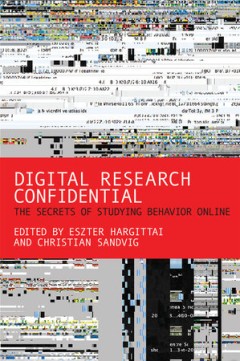Filter by

Digital research confidential :the secrets of studying behavior online
Behind-the-scenes stories of how Internet research projects actually get done.The realm of the digital offers both new methods of research and new objects of study. Because the digital environment for scholarship is constantly evolving, researchers must sometimes improvise, change their plans, and adapt. These details are often left out of research write-ups, leaving newcomers to the field frus…
- Edition
- -
- ISBN/ISSN
- 9780262331227
- Collation
- 1 online resource (xi, 271 pages) :illustrations
- Series Title
- -
- Call Number
- -

The joy of search :a Google insider's guide to going beyond the basics
"How to be a great online searcher, demonstrated with step-by-step searches for answers to a series of intriguing questions (for example, "Is that plant poisonous?"). We all know how to look up something online by typing words into a search engine. We do this so often that we have made the most famous search engine a verb: we Google it--"Japan population" or "Nobel Peace Prize" or "poison ivy" …
- Edition
- -
- ISBN/ISSN
- 9780262354721
- Collation
- 1 online resource (xii, 323 pages) :illustrations (chiefly color)
- Series Title
- -
- Call Number
- -

Digital methods
In Digital Methods, Richard Rogers proposes a methodological outlook for social and cultural scholarly research on the Web that seeks to move Internet research beyond the study of online culture. It is not a toolkit for Internet research, or operating instructions for a software package; it deals with broader questions. How can we study social media to learn something about society rather than …
- Edition
- -
- ISBN/ISSN
- 9781461931867
- Collation
- 1 online resource (274 pages) :illustrations
- Series Title
- -
- Call Number
- -

The laws of the Web :patterns in the ecology of information
An accessible explanation of the hidden patterns found within the seemingly chaotic World Wide Web.Despite its haphazard growth, the Web hides powerful underlying regularities--from the organization of its links to the patterns found in its use by millions of users. Many of these regularities have been predicted on the basis of theoretical models based on a field of physics--statistical mechani…
- Edition
- -
- ISBN/ISSN
- 9780262275835
- Collation
- 1 online resource (x, 105 pages) :illustrations
- Series Title
- -
- Call Number
- -
 Computer Science, Information & General Works
Computer Science, Information & General Works  Philosophy & Psychology
Philosophy & Psychology  Religion
Religion  Social Sciences
Social Sciences  Language
Language  Pure Science
Pure Science  Applied Sciences
Applied Sciences  Art & Recreation
Art & Recreation  Literature
Literature  History & Geography
History & Geography